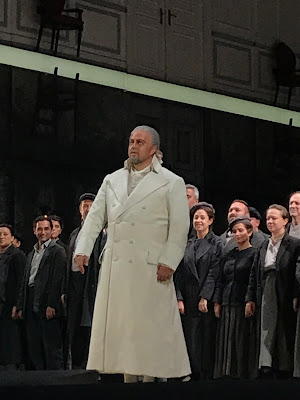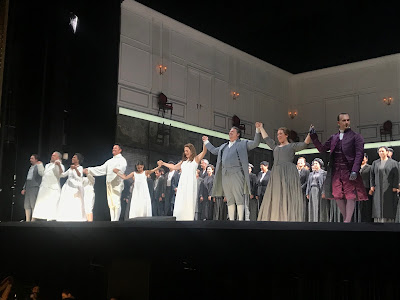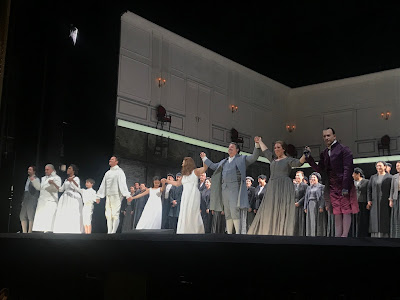(review in English below)
A minha participação no Festival acabou da melhor maneira. Esta Forza del Destino foi incrível em todos os aspectos. A encenação é do mais tradicional que possa imaginar e, na sua simplicidade, foi grandiosa porque com cantores-atores deste calibre, mesmo que não existisse, em nada reduzia a experiência. Se a pudesse resumir, fá-lo-ia como uma sequência de recortes dos locais onde cada cena, cada acto, se desenrola, sobre um fundo temporal (crepúsculo, noite, luar…). O que mais gostei foi a cena do Mosteiro onde, com a simplicidade que referi, sobre um fundo de noite com lua cheia, o mosteiro é como que em formato um recorte de cartolina, inclinado para a direita, com um adro com uma cruz que se inclina para o outro lado - penso que a ideia da inclinação do mosteiro para o direita e da cruz para a esquerda, nos traz a ideia, mesmo antes da cena acabar, que Leonora vai ali conseguir apoio/proteção porque parece que se abraçam.
A direção de Roberto Abbado foi intensa e precisa, com a orquestra a responder muito bem, muito coesa e oferecendo toda a beleza de linhas melódicas líricas que esta ópera tem. O Coro, não do Regio de Parma mas o do Comunale de Bologna (algo que levou a grandes críticas na estreia…) esteve impecável, quer nas passagens mais dramáticas quer nas mais cómico-populares.
Com um elenco de grandes nomes verdianos, a expectativa de uma grande noite era imensa. E assim foi. Gregory Kunde, nos seus 68 anos, foi impressionante. Todos, mas totalmente todos, os seus passos, expressões, movimentos foram perfeitamente tradutores do correcto sentimento da personagem em cada momento. Realmente viveu o papel com uma mestria rara de se ver em palco. A voz continua em grande forma e, mais do que isso, consegue uma variedade de “cores” que não são habituais de se ouvir. A célebre ária de Don Alvaro no início do 3º acto foi perfeita, com os agudos fortes, estáveis e com timbre polido, entrecruzados com um registo médio quente, por vezes algo metalizado, e onde a dinâmica eximiamente ajustada ao sentimento, fazia parecer que ouvíamos vários tipos de vozes a sair do mesmo cantor ao mesmo tempo.
Os duetos com o Don Carlo de Amartuvshin Enkhbat foram simplesmente geniais a todos os níveis. A voz do mongol é impressionante e ele usa-a bem do ponto de vista dramático, quase sempre expressando correctamente o sentimento do texto. Contudo, em grande parte das vezes não se tem uma clara noção da expressão facial, o que é pena porque isso elevaria ainda mais as qualidades deste barítono.
Liudmyla Monastyrska esteve muito bem, embora com um vibrato que, se fosse menos marcado, tornaria o canto mais bonito.
Roberto de Candia fez um Melitone equilibrado, sem exageros desnecessários no sentido cómico a que a personagem se predispõe.
Agora as duas grandiosas surpresas para mim foram a Preziosilla de Annalisa Stroppa
e o Padre guardiano de Marko Mimica.
A italiana, de excelente figura, jovem, tem uma voz fenomenal, uma destreza em palco e uma identificação apaixonante pelo papel. Mas o baixo Marko Mimica, de 35 anos, não lhe fica atrás e, confesso, que foi o maior factor surpresa desta récita para mim. Vemos entrar um jovem, bem apessoado, em traje de monge, num papel que parece para alguém com mais idade, mas esta sensação de inconsistência desaparece quando ouvimos a voz. É brutal!
Um espectáculo fantástico.
(Texto de Wagner_fanatic)
LA FORZA DEL DESTINO, Teatro Regio di Parma, October 2022
My participation in the Festival ended in the best way. This Forza del Destino was amazing in every way. The staging is as traditional as you can imagine and, in its simplicity, it was great because with singer-actors of this caliber, even if it didn't exist, it in no way reduced the experience. If I could summarize it, I would do it as a sequence of clippings of the places where each scene, each act, takes place against a temporal background (twilight, night, moonlight…). What I liked the most was the scene of the Monastery where, with the simplicity I mentioned, against a background of night with a full moon, the monastery is like a cardboard cutout, inclined to the right, with a churchyard with a cross that leans to the other side - I think the idea of the monastery leaning to the right and the cross to the left, brings us the idea, even before the scene ends, that Leonora goes there to get support/protection because it seems that they embrace.
Roberto Abbado's direction was intense and precise, with the orchestra responding very well, very cohesive and offering all the beauty of lyrical melodic lines that this opera has. The choir, not from the Regio de Parma but from the Comunale de Bologna (something that led to great criticism at the premiere...) was impeccable, both in the most dramatic passages and in the most comic-popular ones.
With a cast of great Verdean names, the expectation of a great night was immense. And so it was. Gregory Kunde, in his 68 years old, was impressive. All, but totally all, his steps, expressions, movements were perfectly translators of the correct feeling of the character in each moment. He really lived the role with a mastery rare to see on stage. His voice is still in great shape and, more than that, it achieves a variety of “colors” that are not usual to hear. Don Alvaro's famous aria at the beginning of the 3rd act was perfect, with strong, stable highs with a polished timbre, crisscrossed with a warm midrange, sometimes something metallic, and where the dynamics expertly adjusted to the feeling, made it seem like we were listening different types of voices coming out of the same singer at the same time.
The duets with Don Carlo by Amartuvshin Enkhbat were simply genius on every level. The Mongolian's voice is impressive and he uses it well from a dramatic point of view, almost always correctly expressing the sentiment of the text. However, most of the time we don't have a clear notion of the facial expression, which is a pity because that would elevate the qualities of this baritone even more.
Liudmyla Monastyrska was very good, although with a vibrato that, if it were less marked, would make the singing more beautiful.
Roberto de Candia made a balanced Maeitone, without unnecessary exaggerations in the comic sense to which the character is predisposed.
Now the two big surprises for me were Annalisa Stroppa's Preziosilla and Father Guardiano by Marko Mimica. The Italian, with an excellent figure, young, has a phenomenal voice, a dexterity on stage and a passionate identification with the role. But the bass Marko Mimica, 35 years old, is not far behind her and, I confess, was the biggest surprise factor of this performance for me. We see a handsome young man in monk's garb enter a role that looks like an older person, but this sense of inconsistency disappears when we hear the voice. It's brutal!
A fantastic performance.
(Text by Wagner_fanatic)












































